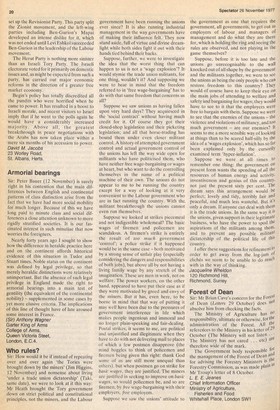Who rules?
Sir: How would it be if instead of repeating over and over again 'the Tories were brought down by the miners' (Jim Higgins, 12 November) and nonsense about living 'under a trade union dictatorship' (Taki, same date), we were to look at it this way: Mr Heath brought the Tory government down on strict political and constitutional principles, not the miners, and the Labour government have been running the unions ever since? It is also running industrial management in the way governments have of making their influence felt. They now stand aside, full of virtue and divine dreamlight while both sides fight it out with their hands tied behind their backs.
Suppose, further, we were to investigate the idea that the worst thing that can happen to us is not a 'wage explosion'? It would stymie the trade union militants, for one thing, wouldn't it? And supposing we were to bear in mind that the freedom referred to in 'free wage-bargaining' has to do with that same freedom that concerns us all?
Suppose we saw unions as having fallen upon very hard days? They acquiesced in the 'social contract' without having much credit for it. Of course they got their closed-shop legislation and their picketing legislation; and all that horse-trading has bound them under even closer militant control. A history of attempted government control and actual government control of the unions has left the way wide open for militants who have politicised them, who have neither free wage-bargaining or wages at heart, but who want to do the controlling themselves in the name of a political machine of their own. The unions do not appear to me to be running the country except for a way of looking at it very convenient to the Labour government who are in fact running the country. With the, militant breakthrough the unions cannot even run themselves.
Suppose we looked at strikes piecemeal and not indigestible wholemeal? The basic wages of firemen and policemen are scandalous. A firemen's strike is entirely the result of too much government `control'; a police strike if it happened would be in the same case — both motivated by a strong sense of unfair play (especially considering the dangers and responsibilities of both jobs), but above all by not having a living family wage by any stretch of the imagination. These are men in work, not on welfare. The power workers, on the other hand, appeared to have put their case as if they were motivated by greed and envy of the miners. But it has, even here, to be borne in mind that that way of putting it may well have been due to the pressures of government interference in life which makes people ingenious and immoral and no longer plain-speaking and fair-dealing. Postal strikes, it seems to me, are political and unjustified and illegitimate when they have to do with not delivering mail to places of Which a few postmen disapprove (the mind boggles to think of policemen and firemen being given this right: thank God some of us are still more unequal than others), but when postmen go on strike for bask wages, they are justified. The miners arc justified in seeking to improve on basic wages, so would policemen be, and so are firemen, by free wage-bargaining with their employers, free employers.
Suppose we saw the unions' attitude to the government as one that requires the government, all governments, to get out as employers of labour and managers of management and do What they are there for, which is holding the ring and seeing the rules are observed, and not playing in the game themselves?
Suppose, before it is too late and the unions go unrecognisable to the wall knocked out of all shape by the government and the militants together, we were to see the unions as being the only people who can restore freedom to this country? They would of course have to keep their eye on the main jobs of attending to welfare and safety and bargaining for wages; they would have to see to it that the employers were free to bargain with thein. Suppose we were to see that the enemies of the unions — the violence and violations of militancy, and too much government — are our enemies? It seems to me a more sensible way of looking at things than to be scared half-silly by the idea of a 'wages explosion', which has so far been explained only by the cursorilY examined term 'hyper-inflation'. Suppose we were at all times to remember one thing: the government 00 present form wants the spending of all the resources of human energy and activity, inventiveness and genius of this country, not just the present sixty per cent. The dream says this arrangement would be perfect; lovely and tidy, terribly fair and peaceful, and much less wasteful. But it's only a dream. If anyone can deal with them it is the trade unions, In the same way it is the unions, given support in their legitimate business, who have the power to spoil the aspirations of the militants among them, and to prevent any possible militant dictatorship of the political life of this country. I offer these suggestions for refinement hi, order to get away from the log-jam oi clichés we seem to be unable to do much with in the way of thinking.
Jacqueline Wheldon 120 Richmond Hill, Richmond, Surrey






































 Previous page
Previous page